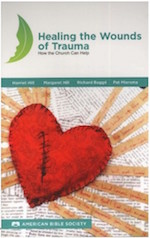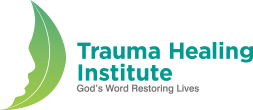

Trauma Healing
Bible-based Trauma Healing
He heals the brokenhearted and binds up their wounds
Ps 147:3
Being trained to help people from a Biblical perspective filled with love and acceptance is a valuable part
of being a Christian and living your life to fulfill God's plan on earth as it is in heaven!
About Trauma Healing

Trauma refers to the psychological and emotional effects on human beings caused by disruptive events like abandonment, and natural disasters,
war, and criminal activities like murder, rape and sexual abuse, human trafficking, and urban violence.
When people experience trauma they are overwhelmed
with intense fear, helplessness and horror.
Reactions to trauma include disrupted sleep,
health, emotions, relationships, and
loss of hope for the future. Traumatized people often turn to substance abuse or
physical aggression, and
perpetuating cycles of violence.
There are not enough professionals to care for a billion hurting people. Instead, the Trauma Healing Institute equips local church leaders with practical, biblical, mental health resources so they can care for their hurting neighbors. These programs are designed so lay caregivers can help people find healing in the life-changing message of the Bible.
We are able to work with Churches, Church groups, Christian Organizations,
and other community groups to provide classes and training
utilizing the materials and program models, developed by the Trauma Healing Institute. Their well proven model combines biblical and
mental health resources into an effective intervention that fosters healing, and restores relationships with God and others.
About the Material
The Trauma Healing Institute's core program is based on a workbook called Healing the Wounds of Trauma: How the Church Can Help.
First developed in Africa in 2001, it has been in regular use since
then. It is now in its fourth revised edition (2016). It provides basic
mental health
concepts within a biblical framework, using Scripture
passages and composite real-life stories to help people connect the
teaching with their circumstances. It has been used with tens of
thousands of pastors, counselors and traumatized people. The materials are now translated
in whole or part into more than 150 languages, and is being used by over 4000 Registered Trauma Healing Facilitators and Caregivers and
is supported by more than 200 partner organizations.
Its four authors include a psychiatrist, a professional counselor, a translation and Scripture Engagement consultant, and a missiologist. Co-author Dr. Harriet Hill now works with American Bible Society and directs the Trauma Healing Institute. Dr. Hill says that trauma is a wounding of the heart, and healing heart wounds happens best in the heart language.
Lesson Content
Lesson 1: If God loves us, why do we suffer?
In
this lesson we will:
* Explain how evil and suffering came into the world, according to the Bible.
* Identify cultural beliefs, teachings about God, and personal experiences that can make it difficult to believe in God’s love when we suffer.
* Learn how to respond to doubts about God’s love.
* Begin to experience God’s love in the midst of suffering.
Lesson 2:
What is a wound of the heart?
In this
lesson we will:
* Explain how trauma is a “heart wound” and identify how it makes people behave.
* Show that God accepts our honest emotions.
* Learn to manage strong feelings through a breathing exercise.
Lesson 3: What can help our heart wounds heal?
In
this lesson we will:
* Care for heart wounds by talking and listening.
* Care for heart wounds by doing an art exercise.
Lesson 4: What happens when someone is grieving?
In this
lesson we will:
* Recognize the different stages of grief.
* Discuss how to respond well to the grieving process in our own lives and in the lives of others.
* Express our pain to God through lament as an important part of grieving.
Lesson 5: Bringing
our pain to the cross.
In this lesson we will:
* Identify our heart wounds and share them with another person.
* Discuss how Jesus died to heal our wounds as well as forgive our sins.
Lesson 6: How can we forgive others?
In this lesson we will:
* Discuss what forgiveness is and is not.
* Explain how to forgive others – the process.
* Explain the process of true repentance.
* Identify those we need to forgive or ask forgiveness from.
Lesson 7: Moral Injury.
In this lesson
we will:
* Describe some of the causes and effects of a moral injury.
* Identify common emotional, spiritual, and behavioral responses to moral injury.
* Give Biblical support for how to handle feelings of guilt and shame.
* Identify helpful ways to care for those experiencing moral injury.
Lesson 8: Helping children who have experienced bad things.
In this session participants will be able to:
* Identify when problem behaviors in children are due to trauma and loss.
* Respond to children in ways that help them express their pain in words, in play, and in art.
* Respond to children according to the Bible; if necessary challenge the way the culture responds to children.
Lesson 9:
Rape and other forms of sexual assault.
In this lesson
we will:
* Define rape and other forms of sexual assault.
* Explain the way rape and other forms of sexual assault affects a person and their family members.
* Discuss ways to help people who have experienced sexual assault heal from their trauma.
* Discuss ways to help communities accept and nurture children born of rape.
Lesson 11: Domestic abuse.
In this lesson we will:
* Define and describe domestic abuse.
* Consider what the Bible says about how we should treat family members and compare that with cultural beliefs and practices.
* Discuss how to help people trapped in abusive situations.
* Discuss how to help abusers repent and take steps toward recovery.
Lesson 12: Suicide.
In this
lesson we will:
* Discuss the causes and effects of suicide on everyone affected by it.
* Explore examples of Biblical characters who considered suicide and evaluate their responses.
* Compare the culture’s understanding of and response to suicide with the Bible and mental health principles.
* Discuss how to tell how seriously someone is considering suicide and respond appropriately.
* Discuss ways to help the loved ones of those who have either attempted or died by suicide heal from the trauma of the experience.
Lesson
13: Addictions.
In this
lesson we will:
* Define an addiction.
* Discuss how people become and stay addicted.
* Gain wisdom from the Bible that can help people who are addicted.
* Discover how to respond appropriately to someone with an addiction according to the stage they have reached in wanting to recover.
* Discuss how to help family and friends of a person with an addiction.
Lesson
14: Caring for the caregiver.
In this
lesson we will:
* Discuss the need to care for ourselves, especially when helping traumatized people.
* Identify difficulties we face in caring for others.
* Assess how well we are caring for ourselves.
* Illustrate the need for self-care from the Bible.
* Set goals for self-care.
Lesson 15: How can we live as christians in the midst of conflict?
In this
lesson we will:
* Discuss the fact that conflict is a part of life, even in the church.
* Identify roots of conflict, especially prejudice.
* Discuss how to live as a Christian with integrity in the midst of conflict.
* Explore how to serve as a bridge between sides of a conflict to bring reconciliation.
Lesson 16: Preparing for trouble.
In this
lesson we will:
* Show from the Bible that it is wise to prepare for trouble.
* Discuss how individuals and families can prepare for trouble.
* Discuss how to help the community prepare physically and spiritually for trouble.
* Discuss how the community can organize communication channels in case of crisis.
Copyright (c) 2017 Pat Kempf. All rights reserved.







